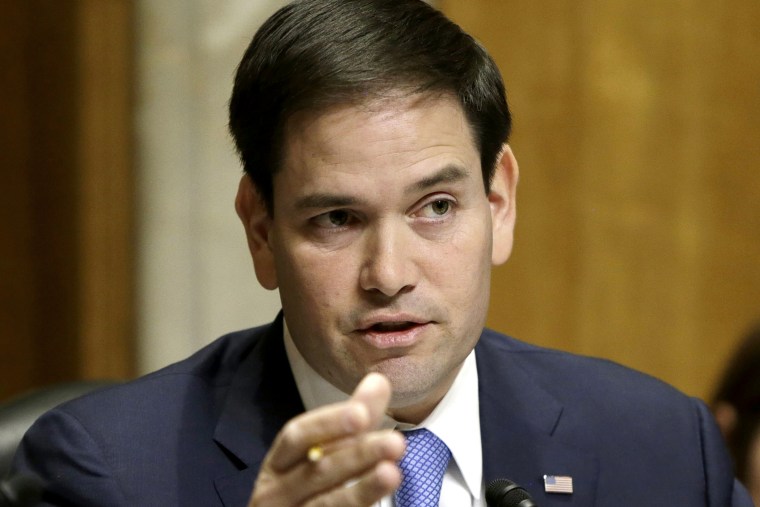As Sen. Marco Rubio (R-Fla.) gets ready to launch his presidential campaign, he's making the rounds and fine-tuning his message, all of which brought the Florida Republican to the set of Fox News' "The Five" yesterday. There was a noteworthy exchange that stood out for me.
The conservative co-hosts seemed preoccupied with the Hillary Clinton email story -- one called it "so devastating" -- though Rubio was largely dismissive of the story, saying the former Secretary of State has "bigger problems than emails."
But the co-hosts stuck with the story they care about, which led Fox's Julie Roginsky to raise a good point. From the Nexis transcript:
ROGINSKY: I guess this is -- this is the question for everybody and any position of influence. Do you have a private server or private email that you ever use or -- RUBIO: Sure. But I don't put sensitive information on there and I'm not then, I'm not involved in, in you know, communicating with my staff about things that put the diplomacy of the United States at risk. In fact, I don't write anything that is national security related on an email, because I know that they are potentially targets for foreign adversary. ROGINSKY: And this is not directed to you, but I think directed to anybody who would give that quite answer, would you be able to then, disclose all your private emails so that you can assure people with that?
At this point, Dana Perino, the former press secretary in the Bush/Cheney White House, jumped in to criticize Clinton in more detail, and Rubio never responded to the question.
Which is further evidence that the politics of emails is trickier than Republican would like.
A few weeks ago, shortly after the media broke the story about Clinton using a private email account for official use, the Wall Street Journal reported that Rubio also used a private email account for official use. The article added, "When the Orlando Sentinel filed a public-records request for the emails from the private account about the legislative session, Mr. Rubio's spokeswoman said they had been deleted."
In Clinton's case, the former Secretary of State concedes she did official work on her private account, but she insists the deleted private emails had nothing to do with her official duties, but Republicans don't believe her. The way to be certain, Clinton's GOP critics argue, is to pursue full disclosure -- up to and including careful technology scrutiny of computer servers -- just to make sure she didn't do anything wrong.
Why, Republicans argue, should Clinton be trusted to make decisions on her own about which of her emails should be deleted?
But in an unexpected twist, it was a question from a Fox News co-host that demonstrates how easy it is to remove "Clinton" out of that sentence and put in the name of several Republican presidential candidates, including "Rubio." Consider:
In Rubio's case, the senator concedes he did official work on his private account, but he insists the deleted private emails had nothing to do with his official duties. Perhaps the way to be certain is to pursue full disclosure -- up to and including careful technology scrutiny of computer servers -- just to make sure he didn't do anything wrong.
Why should Rubio be trusted to make decisions on his own about which of his emails should be deleted?
I suppose the obvious answer is that the Florida senator isn't accused of any official wrongdoing, so there's no need to review his communications. But -- and this is key -- Clinton isn't facing any serious allegations, either, Benghazi conspiracy theorists notwithstanding.
For a while, Clinton's critics thought the email story would be a clean, easy hit on the likely Democratic nominee. It's not turning out that way.
